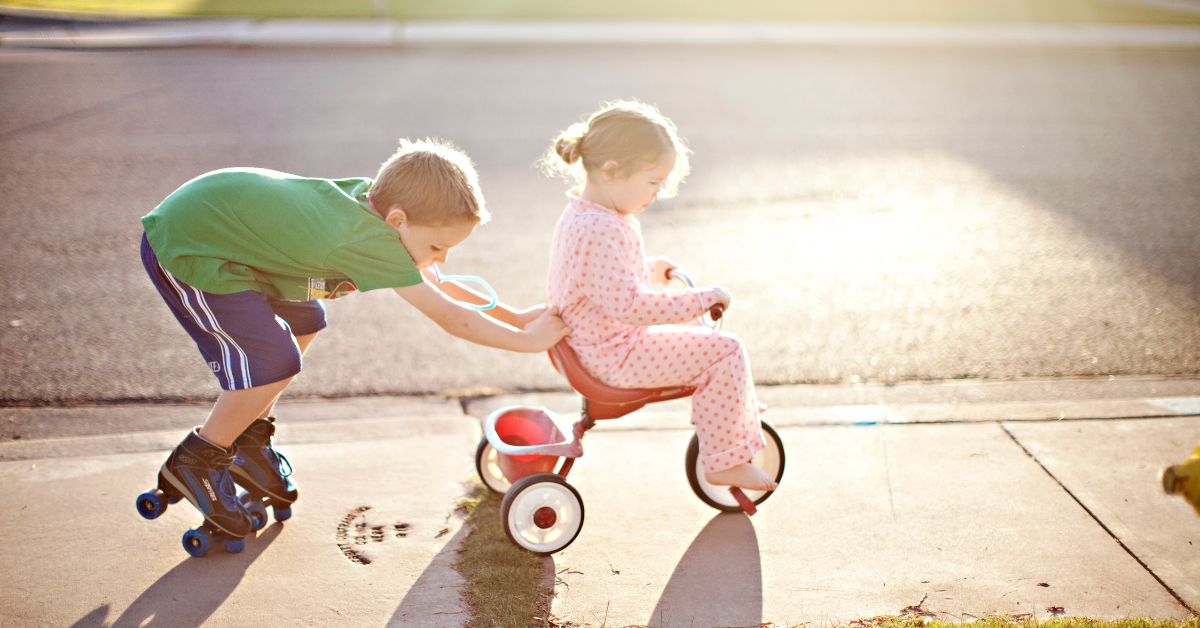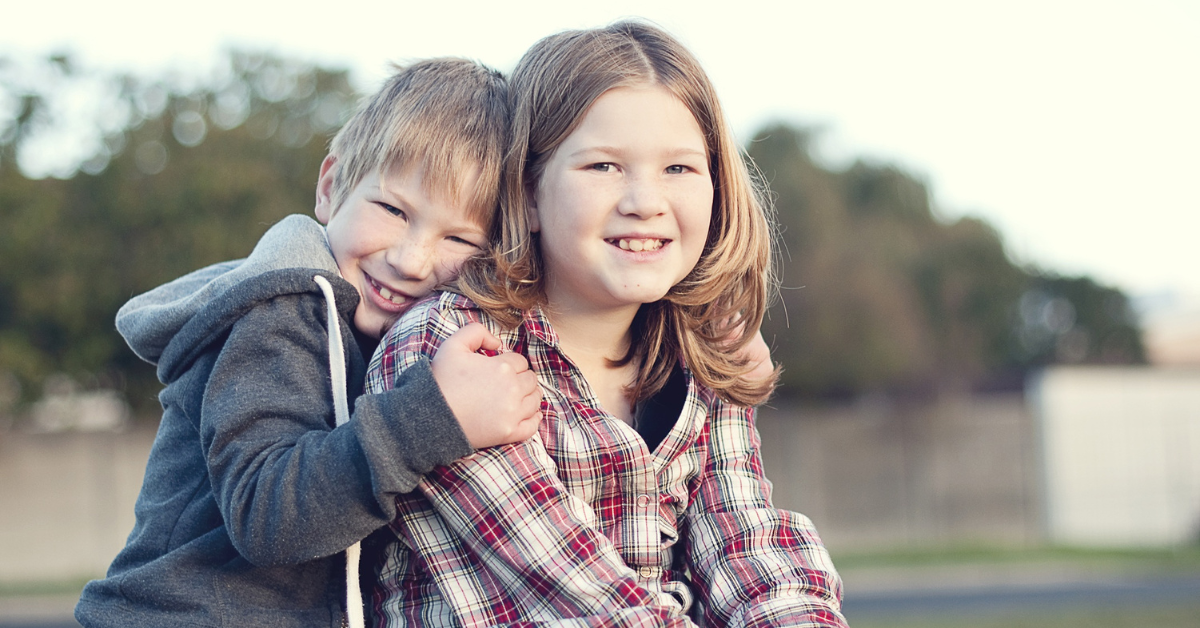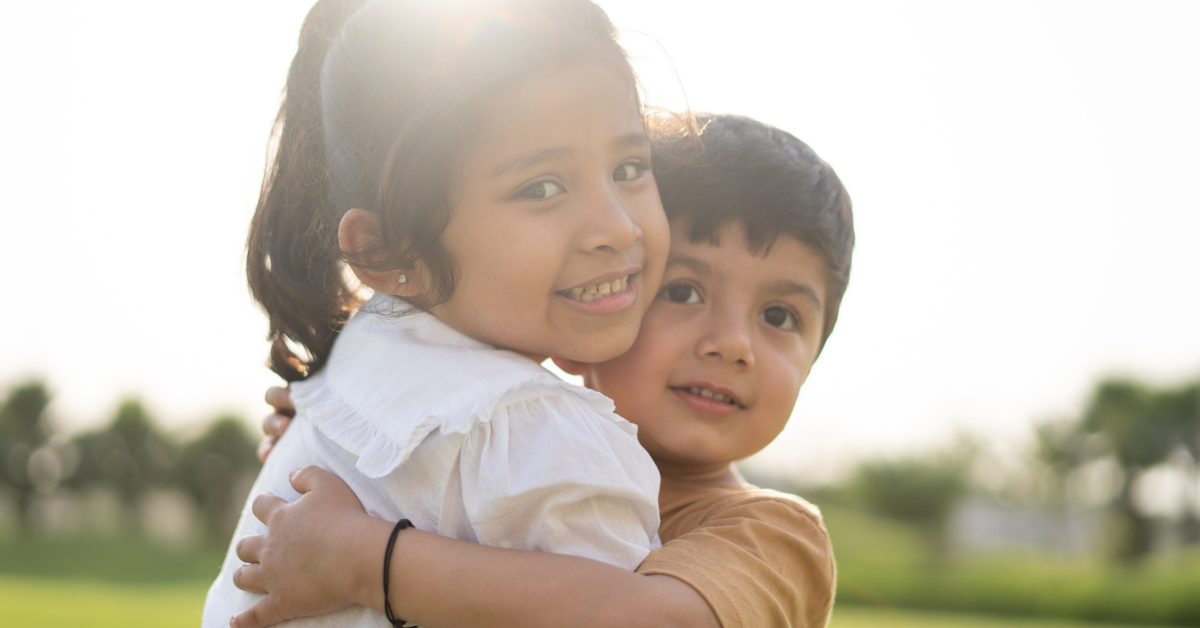
The worst for me was at bedtime: the kids were arguing. The oldest doesn’t want her younger sibling in her room. The younger one wants to read stories in big sister’s room. It’s escalating, and I’m about ready to pull my hair out or cry. Can’t they just stop? Why the constant bickering??
Sibling fighting is one of the hardest things we have to deal with as parents.
One-on-one, we may have great relationships with our kids, but get them together and we can be miserable with the teasing and warfare.
I want my daughters to be the best of friends and love and support each other throughout their lives—a built-in friend!
Yet we know that sibling relationships can be difficult. Mistreatment by siblings can lead to issues of worthiness that impact people for the rest of their lives.
What can we, as parents, do?
The first thing is stop worrying about them being “friends,” and instead focus on equipping them with the attitude and skills they’ll need for all of their caring relationships.

MODEL RESPECTFUL COMMUNICATION
The best thing to focus on is modeling respectful communication and conflict resolution—it’s the most powerful form of learning. If win-win problem solving is how you resolve conflicts in your family, that will be their go-to method.
When you empathetically listen to their upset feelings (even about a sibling), rather than dismiss them, you model compassion and respect. If you adopt and model these attitudes and skills, you’ll go a long way to successfully guiding your children.
CULTIVATE A GOOD RELATIONSHIP
We can also help cultivate positive relationships between siblings by doing whatever you can to get the good feelings flowing between them. Talk about how lucky they are to have their sibling. Let your kids overhear you talking to your parenting partner about the fun and nice things they did together that day. Seek out picture books that celebrate siblings. Find activities that they can do together. Instead of asking them to compete (“Who can get dressed the fastest?”), invite teamwork. Say to them, “You two are some team. Do you think you can get your shoes on before the timer beeps?”

AVOID COMPARISON LIKE THE PLAGUE
For positive sibling relationships, avoid praise and comparison like the plague. Comparison can generate competition, jealousy, and rivalry among siblings. If you say, “Look at how quickly Téa cleaned up. Can’t you clean up like that?” you’ll just add to resentment between the kids. Instead of comparing, try to praise your child without any reference to the sibling by simply describing what you see, feel, like, or do not like.
DON’T BLAME THE BABY
If you have a baby, try not to blame things on the baby. If you say, “I can’t play with you now, I have to nurse the baby” you may inadvertently lead your older child to hate their new sibling. It can help to play up the older child’s new role as Big Brother or Big Sister, but after a time, let the roles drop.
Being labeled as “the baby” or “the responsible one” forever can lead to resentment between siblings. Instead, practice to be open to each child as an individual. Practice “beginner’s mind” to see them with fresh eyes and an open mind.
But what about the fighting? I remember epic fights with my brother when I was a child. If it got bad, mom or dad would intervene and solve the problem, acting as judge and jury. Yet, one of us left feeling resentful because the other sibling had won. Jumping in to intervene too often is a common mistake because kids never have a chance to resolve their own conflicts. We need to give them a chance to work things out, but what if it gets dangerous?

Here’s a quick guide to when to jump in and handling sibling conflicts from Siblings Without Rivalry by Adele Faber & Elaine Mazlish:
HOW TO HANDLE KIDS FIGHTING
First Degree: Normal Bickering
- Ignore it. Remind yourself that your kids are having an important experience in conflict resolution. It’s okay if they do it imperfectly.
Second Degree: Fight is Heating Up. Adult Intervention Might Help
- Acknowledge the heated feelings. “You two sound really mad at each other!”
- Reflectively listen without adding judgment. Respect that this is hard for them. “Sounds like you want to have Bear sit at the bottom, and you want Bear to be at the top of the tower.”
- Express your confidence in their ability to work out a solution that feels fair. “I know that you two can work out a solution that feels fair to both of you.”
- Leave the room.
Third Degree: Someone’s About To Get Hurt. Adult Intervention Needed
- Describe what you see. “Looks like you both are really angry and about to hurt each other.”
- Set boundaries. “No hurting is allowed in our home.”
- Separate them. “Right now we all need time to cool off before we resolve this.”
Fourth Degree Someone is Hurt
- In this case, give attention first to the hurt child, not the aggressor. Then proceed to the Third Degree process.
Remember that you can’t do this perfectly—no one can. However, we can continuously aim for the goals of peace and connection in our families as our North star.
For more resources, click HERE to learn about the Mindful Parenting Course or click HERE to learn about the Raising Good Humans Books!
